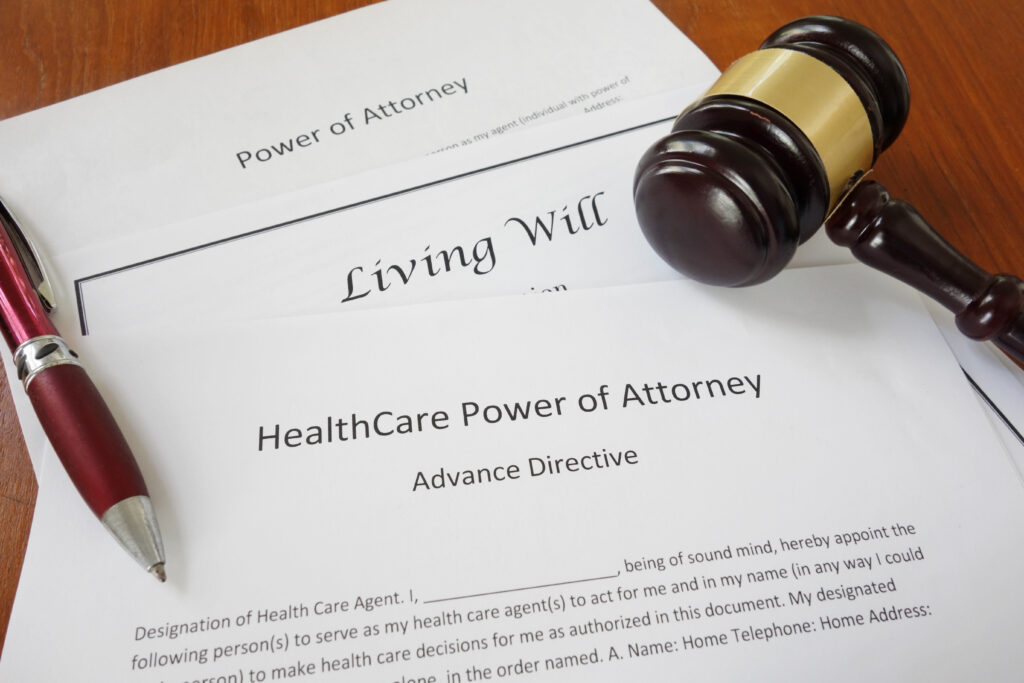Power of Attorney, Guardianship and Conservatorship. What happens when you are no longer able to make decisions for yourself?
When you’re no longer cognizant, who’s speaking on your behalf? To ensure autonomy in the face of incapacitation or death, you’ll want to find trusted legal representatives to speak on behalf of your financial and medical instructions and wishes. What do you wish to happen with your assets? Do you and for how long would you want to be kept alive in a vegetative state? Although these questions may be hard to face, they’re crucial to assuring you and your loved ones have answers going into the final days.
Consulting an Elder Law attorney is the first step to long term planning of medical needs and last testaments, along with financial oversight and protection of your assets. Elder Law attorneys specialize in addressing issues related to Power of Attorney, Advanced Directives, and Guardian and Conservatorships. All options address who will legally be designated as your alternative decision maker to carry out what you want to have happen to you and your things in the face of incapacitation or death.
- Power of Attorney, Guardianship and Conservatorship. What happens when you are no longer able to make decisions for yourself?
- Power of Attorney for Financial Management
- Advanced Directive for Healthcare – Power of Attorney for Medical Needs, Living Wills
- Guardianship and Conservatorship – What happens when you don’t have Power of Attorney?
- Plan Ahead for your End of Life Care – Why you want to avoid going to court
- Helpful Resources and Links
Power of Attorney for Financial Management
Power of Attorney is a document that you and your attorney draft granting them legal authority over your finances and distribution of assets. This agreement designates that your attorney is someone you trust to manage your finances and lays out the scope of power you want them to have in doing that. As you become unable to make decisions on your own, a reliable POA will serve to best manage your bills, investments, and distribution of assets through wills and trusts when you pass away. In the case of your passing, the durable POA will have the legal authority to determine who gets what you leave behind.
If you find yourself no longer wanting to honor your current Power of Attorney agreement, you can revoke the document at any time as long as you’re still able to demonstrate substantial faculties and are aware of what’s going on.

Advanced Directive for Healthcare – Power of Attorney for Medical Needs, Living Wills
It’s equally vital to establish a legal Power of Attorney over your medical needs and desired outcomes related to your last will and testament. An example of a medical Power of Attorney would be an Advanced Directive, though the terms for these agreements may vary by state.
An Advanced Directive does two main things…
- It names a healthcare representative to make decisions when you no longer can. This also comes with the naming of alternates, aka who else to call when someone can’t be reached in relation to your medical updates.
- It includes instructions for your representative and doctors concerning what to do when you reach a certain level of medical decline.
As much as you want your documentation to represent all your wishes as you gradually pass away, end of life scenarios don’t always play out this way. Your health could decline rapidly over night, and you may not have fully discussed what exactly you want to occur in a state of incapacitation.
The question then presents itself: What/Who has authority between the Advanced Directive or your POA Representative to provide answers to questions you had not yet finalized? Do you want to have the plug pulled and when?
In approaching these final questions, your trusted POA will use whatever instructions they do have to provide guidance for a final determination. In assessing what you value and who you are as a person in your discussions and drafts, your representative will determine what decision seems best suited for you in the face of the unknown.
Guardianship and Conservatorship – What happens when you don’t have Power of Attorney?
In the case of an end of life or incapacitated situation without a Power of Attorney established, someone will have to go to court and report that you are unable to make decisions for yourself and the court will then have to name representatives for you.
This is where Guardianships and Conservatorships come into play. Guardians deal with your medical decisions and personhood. They figure out where you’re staying, and monitor your day to day functioning. A Conservator handles your finances, bank accounts, incomes and assets.
Plan Ahead for your End of Life Care – Why you want to avoid going to court
Having to go to court to establish Guardianships and Conservatorships can be an overwhelming hassle for whatever friends or family members have to represent you. This process will lead to expensive court dates and intense questions regarding your end of life wishes between those who may have differing opinions. Your spouse feels you want to have the plug pulled while your parents fight to keep you on the tubes – this is not an ideal scenario. And ultimately, these decisions are made by a judge who doesn’t even know you. Planning ahead can help you avoid a lot of residual stress for those you leave behind.
Trusted Powers of Attorneys over your medical and financial needs are crucial to assuring there are answers to end of life questions, and most importantly, they’re your answers. Consult an Elder Law professional and establish peace of mind for you and everyone involved.

Helpful Resources and Links
The National Academy of Elder Law Attorneys (NAELA) is dedicated to improving the quality of legal services provided to older adults and people with disabilities. Elder and special needs law includes helping such persons and their families with planning for incapacity and long-term care, Medicaid and Medicare coverage (including coverage of nursing home and home care), health and long-term care insurance, and health care decision-making.
